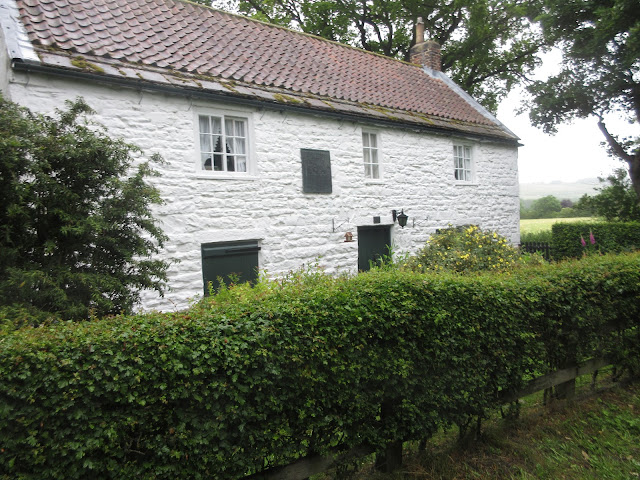A walk on the Wylam side. (Northumberland) June 25th
Four of us, John H., John Ha., Dave and I had planned to spend the day walking the shore of Kielder Water looking for Ospreys. However the forecast was for a day of drizzly rain and Dave the ornithologist said ospreys were unlikely to be out much so we changed plans and chose a walk nearer home. The walk, devised by John H., starts and finishes in Wylam, a village ten miles west Of Newcastle. A69, turn off for Wylam. Head through the village and just before the bridge over the Tyne there is a car park on the left and it's free!.
The walk is covered by OS Explorer 316 Newcastle upon Tyne and it is recommended although there are plenty of markers.
Wylam free car park, the walk starts on the track at the back.
Wrapped against the light rain we started off on the walkers/cyclists/riders track at the back of the car park. The track is built on an old disused railway line and goes most of the way to Newcastle. On the way it passes Stephenson's cottage, the birthplace of the railway pioneer.
Stephenson's cottage, Wylam, closed.beyond the cottage and only for a short distance, we joined the Hadrian's Wall Path which goes off to the right and is closer to the river though further away from the eponymous wall. We stayed on the old railway line until we reached Heddon Haughs where we turned left, walked through a farmyard and started the first climb of the day up Station Road to Heddon on the Wall. The best part of a mile and quite steep. Just before reaching the village centre we took the first street on the left and wandered through a small estate before reaching the road at Heddon banks Farm and heading downhill, a bit annoying having just walked uphill. Turning left at Close Lea we were soon in the Close House golf course area. We followed a footpath through Ashbank Wood and Raven's Dene before crossing a couple of fields and taking the road downhill to the outskirts of Wylam village.
Turning right at the junction we walked uphill on Holeyn Hall Road before taking the path on the left across fields. Turning right we walked the edge of fields to Horsley Wood where we followed a woodland path that on a sunny day would have been a delight. We joined the road for a short distance near Wylam Hall and then continued on a footpath to Wylam Cricket Field, suitable place for a Herbie in the rain.
Grey day in NorthumberlandThe Tyne from close to Hagg Bank bridge. The smoke is from the toilet paper factory at Prudhoe.
After a lunch including chocolate mini rolls, snickers, Bliss bars and apple pies we headed into Wylam, passing the home of another railway pioneer,
Timothy Hackworth, another Wylam railway pioneer.
Walking on we crossed the river by the Wylam Bridge, crossed the Newcastle- Carlisle Railway line, passed the Boathouse which claims to be" probably the best pub in the world". It usually has at least a dozen ales on hand pump but today we walked on by, the shame of it.
Someway beyond the pub we took the footpath on the right through Daniel's Farm. This part of the walk is on the Heritage Way, an eighty mile ramble that circles Tyneside and Wearside.
Heritage Way marker and common footpath marker.
The footpath through the farm has deer fences on either side. We must have seen a hundred deer in the fields. They are raised for venison. They are beautiful animals, the almost vegetarian in me was not happy.
Several fields later we were at Bradley Hall Farm and having crossed Bradley Park we reached the old stretch of road parallel to the A695. Turning right we walked to Crawcrook almost before taking the footpath on the left that turned back for a while before heading downhill across fields back to Daniel Farm where we made friends with a turkey and some Llamas.
Back on the road we were soon at the car park (passing the Boathouse again!) and off we went, home.
Contains OS data, copyright. Crown copyright and database right 2021
The walk is about 10.5 miles and even on a damp day is very enjoyable, woodland, fields, views and normally a great pub at the end!
Hang Bank Bridge, model for the Tyne bridge
Mother duck. Her babies are below the weir






































































